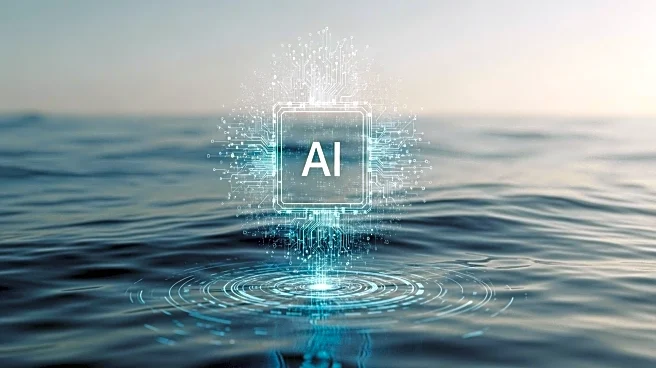What's Happening?
Researchers at the University of Hawai'i have developed a new artificial intelligence tool designed to assist scientists in analyzing complex geoscience data, particularly for tracking sea levels on Earth. The tool, detailed in the Journal of Geophysical Research, is spearheaded by Matthew Widlansky, a climate scientist and associate director of the University of Hawai'i Sea Level Center. The AI tool is not only capable of measuring sea levels but also has potential applications in analyzing atmospheric conditions on Mars. This development represents a significant advancement in the use of AI for environmental research, providing scientists with more precise and comprehensive data analysis capabilities.
Why It's Important?
The introduction of this AI tool is crucial for enhancing the accuracy and efficiency of sea level measurements, which are vital for understanding climate change impacts. Accurate sea level data is essential for predicting coastal flooding, managing water resources, and planning infrastructure in vulnerable areas. The tool's ability to analyze atmospheric conditions on Mars also opens new avenues for space exploration and research. By leveraging AI, scientists can gain deeper insights into environmental changes, potentially leading to more informed policy decisions and strategies to mitigate climate-related risks.
What's Next?
The AI tool is expected to be integrated into ongoing research projects at the University of Hawai'i Sea Level Center, with potential collaborations with other research institutions. As the tool's capabilities expand, it may be used in broader climate studies and space exploration missions. Researchers anticipate further developments in AI applications for geoscience, which could lead to more sophisticated models for predicting environmental changes. Stakeholders in climate science and space research are likely to monitor the tool's progress and explore its applications in their respective fields.
Beyond the Headlines
The development of AI tools for geoscience research highlights the growing intersection between technology and environmental science. This trend raises ethical considerations regarding data privacy and the potential for AI to influence public policy. As AI becomes more integrated into scientific research, there is a need for transparent methodologies and accountability in data interpretation. The tool's application in space exploration also underscores the importance of interdisciplinary collaboration in advancing scientific knowledge.











